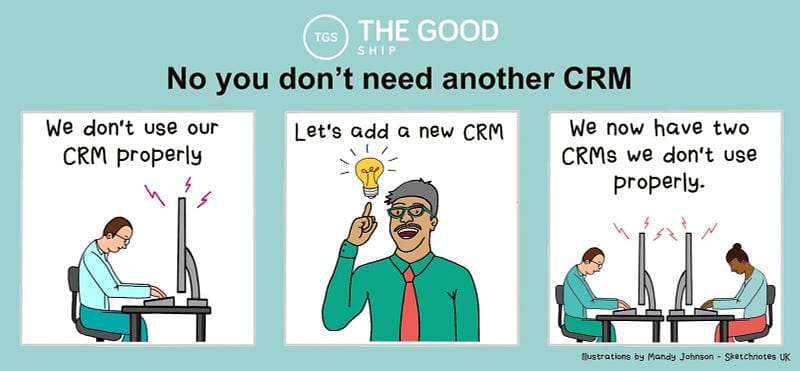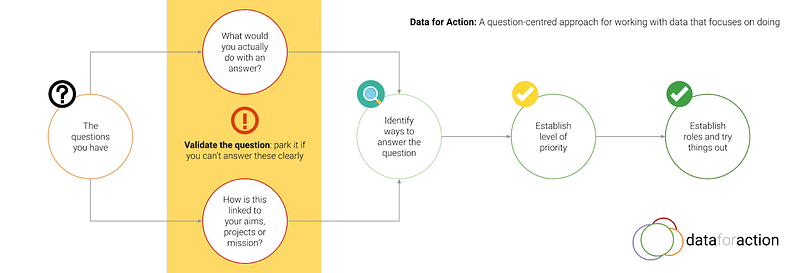Is it the CRM?
Is the problem really the CRM or which CRM and how it was implemented (or not!)

One of the sneak peak headlines from the Charity Digital skills survey sprung out to me this week and it was this
53% say their database or CRM (Customer Relationship Management System e.g. Salesforce, Dynamics, Lamplight) is causing significant challenges for their organisation.
While that 53% might seem high, it’s not entirely surprising. As part of the Power to Change Powering Up program, I provide digital and data advice to community businesses. CRM and database challenges are a recurring theme. In fact, over a third (38%) of organizations that joined the program specifically sought support with a CRM or database, or recognized it as a problem area.
My role in the program is to offer impartial advice rather than directly fix, implement, or improve systems like their CRM. I help community businesses answer questions like:
- Do you really need a CRM?
- What do you need a CRM or database for?
- What type of CRM or database might be suitable?
- Who could help you implement a CRM or database?
- What type of budget might you need?
Community businesses in the Powering Up program receive support and funding for technical implementation. My experience with these businesses has given me insight into six main reasons why CRM and databases cause problems:
- It’s a crap CRM or database.
Honestly I try to be fairly agnostic about tools or systems. I think for most things there are a whole number of systems that will work. There will be trade offs, and some are better than others, but generally it’s about how they are used and implemented. However there are sometimes just crap systems. It happens.
2. It’s an inappropriate CRM or database.
Often, organisations use a CRM or database designed for a larger or different type of organisation. They may have chosen it based on free licences, but don’t have the in-house technical skills to make necessary changes. It’s not necessarily a crap system, but it’s crap for that organisation.
3. The CRM or database wasn’t implemented properly
Organisations frequently underestimate the time and costs required to implement a new system, cutting corners and leading to issues later.
4. The organisation has changed
As organisations evolve, their needs change, and systems must adapt accordingly. This is why it’s essential to have adaptable systems and the skills or support to recognise and implement change. It’s also important that organisations document systems, so that when people move on, the knowledge doesn’t move on with them.
5. Your people weren’t involved
People across an organisation have a role in how well or badly your CRM or database works for you. But often they aren’t part of deciding which system, or what they need from the system, and this leads to problems. Like any change in an organisation, you need to bring everyone with you and to do it well people need to really be involved.
6. The big one. The questions are wrong
The biggest problem I see with CRMs and databases often isn’t anything to do with the underlying system, it’s to do with not understanding what we want to use the data for. Often there wasn’t thought to the actual questions the organisation wanted to answer and so the structure and data is not useful. The CRM doesn’t help us because we weren’t really clear when we got it, what we really needed from it. What this often leads to is organisations thinking the CRM is to blame, and so they need a new CRM to fix the problem. I have a cartoon about that….
So what can you do about it?
For funders, ensure that organisations you support have access to impartial advice on CRM and database selection and implementation. By investing in advisory services, you can save organisations the higher costs of fixing mistakes down the line. That’s why I think the Powering Up Programme is great. Yes it costs some resources (1–2 days on average per organisation) for my services, but the costs of getting it wrong for an organisation are much much higher.
For organisations
If you are an organisation thinking about CRM’s or databases there are a few things you can do and it depends on where you are and what you are struggling with.
- Get some advice
A good starting point would be to get some advice. You might want to start with Digital Candle for 1 hr free advice with experts (like me). This might not fully solve your problem, but it can give you a solid start.
2. Reach out to other organisations or trusted people
There are a lot of people out there who can probably help. If you’ve got some money, that’ll help, but there are networks like Tech for Good and others who can help. Go to some free training by Third Sector labs, join the Data Collective, speak to friends Be More Digital, look for some pro-bono from Reach Volunteering or ask your funders for help.
3. Play around with adaptable tools
A couple of years ago myself and Tom French put together a CRM template in Airtable because we both kept seeing these problems play out again and again. The template and Airtable might not suit your needs, but it is probably the lowest entry point technically that organisations can have to explore what they might need a system to do. It’s not about Airtable being a solution, but it might help you get to a solution. Have a go, find out, fail, learn, for free.
4. Start with questions
Stop me if you’ve heard me say this before. For me this is the most fundamentally important aspect to get right, especially when talking about CRM’s. At Data for Action we use questions to get to the heart of what an organisation is trying to do and to understand with data. This simple approach helps to democratise data across the organisation, so data support knowledge and action. Use some of the free resources to help you take a question centred approach to data.

So, when thinking about a new CRM or database, remember, it’s not just about the system itself, it’s about your people and understanding what you need from it.
Feel free to get in contact with The Good Ship or reach me on linkedin or twitter.